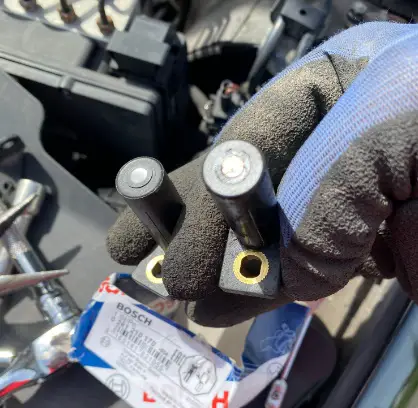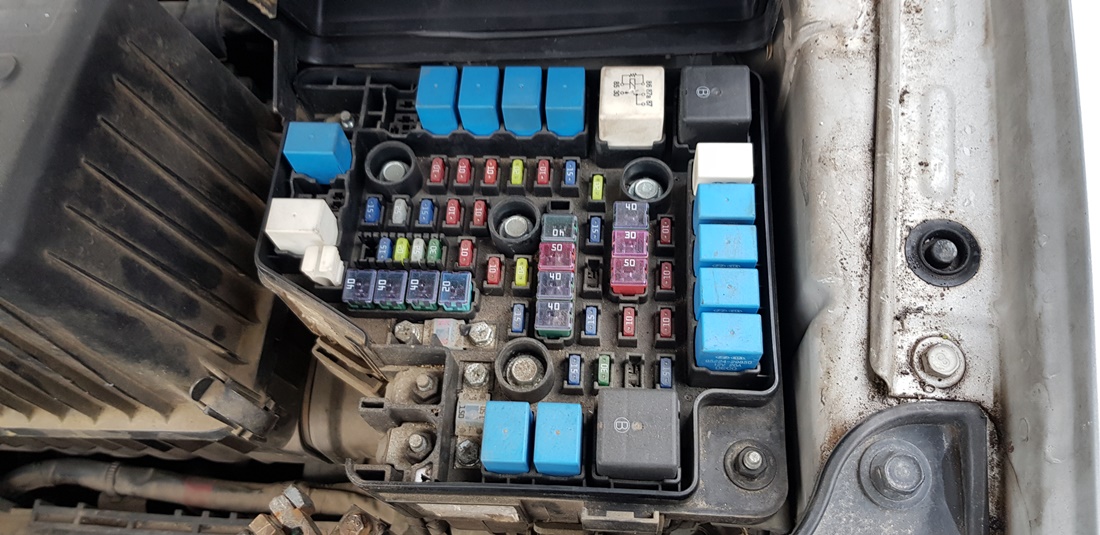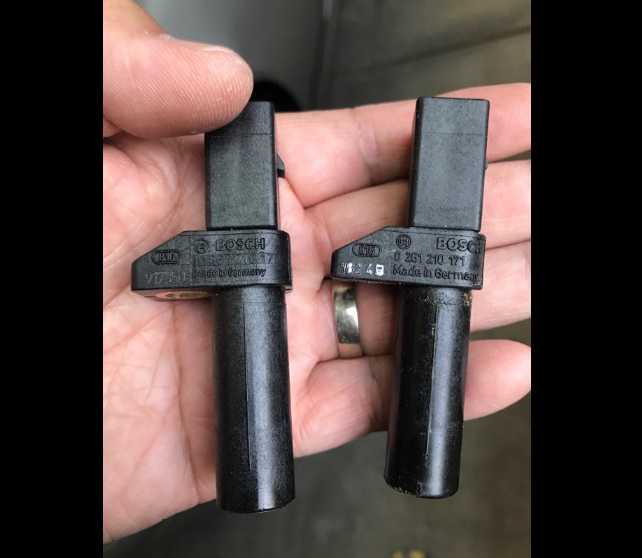When you buy your vehicle, it’s up to you to maintain it well enough so it will achieve the highest possible fuel economy. At first, it may sound like an easy task, but it is more complicated.
You could end up neglecting your vehicle due to not having enough time or money to invest in it. If your vehicle isn’t getting the needed preventive maintenance, you might end up asking yourself ”Why is my car burning gas so fast”’?
Key Takeaway
- A car may burn gas faster due to several reasons including aggressive driving, poor tire pressure, heavy loads, using the air conditioner excessively, faulty spark plugs, dirty air filters, poor engine tuning, a malfunctioning oxygen sensor, or a clogged fuel injector.
- To stop your car from burning gas, you can improve fuel efficiency by avoiding aggressive driving, maintaining a steady speed, reducing excess weight in the car, and following regular maintenance practices.
Why Is My Car Burning Gas So Fast

- Low tire pressure
- Vacuum leak
- Leaking fuel injector
- Fouled or dirty spark plugs
- Dirty air filter
- Stuck brakes
- Loose gas cap
- Driving with a cold engine
- Using the AC
- Sudden acceleration
Your vehicle might be burning more gas than usual. If your car is burning gas more than usual, the issue could be mechanical or something else. Here are the top 10 reasons why your car is burning gas so fast:
1. Low Tire Pressure
A vehicle with low tire pressure causes the engine to increase its RPMs resulting in a loss of miles per gallon. Inflating the tires with the correct psi will ensure that your vehicle gets the best fuel economy.
A good rule of thumb is to inflate the tires to four to five psi less than the maximum amount. The recommended tire pressure for your vehicle will be located on a sticker on the driver’s side, or on the tire itself. Also, having the right size of tires is also key.
2. Vacuum Leak
When your vehicle has a vacuum leak, it causes the air-fuel ratio to lean out. Once this happens, the oxygen sensor communicates with the electronic control unit to increase the fuel so the engine doesn’t run lean. This results in a richer fuel mixture causing poor fuel economy.
In most cases, you’ll notice the engine has a rough idle or up-and-down idle like a search. These are all indicators of a vacuum leak. Other sources of vacuum leaks are fuel injector seals, take manifold gaskets and throttle body gaskets. Repairing the vacuum leak will increase mpg and fix the idle issues.
3. Leaking Fuel Injector
A leaking fuel injector will definitely cause poor fuel economy. The fuel injectors are in charge of spraying fuel into the combustion chamber. if they are leaking, more fuel will be sprayed and that fuel will be wasted. Some people choose to repair their fuel injectors instead of replacing them. Personally, I always will go for a new fuel injector.
4. Fouled or Dirty Spark Plugs
Having fouled or dirty spark plugs can cause bad MPG. This happens when fuel is sprayed into the combustion chamber, but the spark does not ignite the fuel.
When fuel is added to a cylinder and it doesn’t combust, it gets wasted. This causes bad gas mileage. Replacing the spark plugs with new ones will ensure a good idle and better fuel economy.
5. Dirty Air Filter
A dirty air filter will definitely cause bad MPG. When an air filter is dirty and clogged, that causes the engine to struggle. This can even leave the lean conditions causing your engine to overheat.
Replacing the air filter with a new one or cleaning it, if it’s a K&N filter, can improve miles per gallon by up to ten percent. It’s been reported that clean air filters can save up to thirty-two cents per gallon or add up to 23 miles per tank.
6. Stuck Brakes
Stuck brake pads and calipers may not sound like something you’ve heard of, but they will most definitely cause bad gas mileage. I have personally seen as much as 15 miles per gallon loss from stuck brake calipers.
Once the brake caliper guides and clips were clean and properly installed, the MPG increased from 18 miles per gallon to 36 miles per gallon.
In most cases, this can result from over-greasing the caliper guide bolts. This causes air pockets that don’t allow the caliper to rest in the correct position and results in the brake pads being pressed against the rotor.
In some cases, the brake caliper is bad and needs to be replaced. Ensuring your brake clips and caliper guide bolts are properly assembled will help yield the best fuel economy says RepairPal.
7. Loose Gas Cap
A loose gas cap can and will cause poor fuel economy. This happens because the gas vapors are able to evaporate out of the gas tank. Think of it like rubbing alcohol in an open environment. If the rubbing alcohol isn’t sealed, then it will evaporate to nothing quickly.
This is the same principle as gasoline. Turning your gas cap three clicks will ensure the gas cap is properly sealed and gas vapors will not escape. Studies find that a loose gas cap can cause up to a 10% decrease in fuel economy.
8. Driving with a cold engine
A vehicle reaches its maximum fuel economy after the engine reaches the optimal engine temperature. Some engines warm up faster, some slower. It is important that you warm up your engine before you go for a ride.
Now, if you have 5,6 short trips throughout the day, that means you will have to warm up the engine 5,6 times. This is where planning your day comes into play. if you plan your short trips and group them together, you won’t have to warm up your engine that many times per day.
9. Avoid using the A/C
Try driving without using the A/C, when the weather allows it. If you live in a place where it’s hot, driving without the A/c can be impossible. But, if you live in a country with mild temperatures, try rolling down your windows and driving like that whenever possible.
10. Avoid sudden acceleration
This is the last reason why your vehicle is burning more gas than usual, but it can be the most important one. You could be the biggest obstacle to maximizing your vehicle’s fuel efficiency.
If you are a fan of sudden acceleration, speeding, and not driving at a constant speed, all of this can impact your vehicle’s fuel efficiency. Try to accelerate smoothly and try to maintain a driving speed of 55 miles per hour. That speed is the best if you want to have good MPG.
How Do I Stop My Car From Burning Gas?
To stop your car from burning gas:
- Ensure your tires are properly inflated to the recommended pressure.
- Avoid aggressive driving habits, such as rapid acceleration and hard braking.
- Maintain a steady speed while driving on highways or open roads.
- Reduce unnecessary weight in your car by removing any heavy items.
- Use the recommended grade of motor oil for your vehicle.
- Keep up with regular maintenance, including air filter and spark plug replacements.
- Consider using fuel-efficient driving techniques, such as coasting when possible and avoiding excessive idling.
- Plan your routes efficiently to minimize the distance traveled and avoid traffic congestion when possible.
- Limit the use of accessories and features that consume extra fuel, such as air conditioning and high beams.
Does Fuel Efficiency Normally Change Over Time?
Yes, fuel efficiency can change over time due to various factors. As a vehicle ages, the engine and other components may experience wear and tear, which can impact fuel efficiency.
Additionally, poor maintenance practices such as neglecting regular tune-ups, using low-quality fuel, or driving with underinflated tires can also contribute to decreased fuel efficiency.
It’s important to note that certain technological advancements in newer vehicles can improve fuel efficiency compared to older models.
It is recommended to follow the manufacturer’s maintenance schedule, drive responsibly, and keep the vehicle in good condition to help maintain optimal fuel efficiency over time.
Is It Bad To Let Your Car Run Out of Gas?
Letting your car run out of gas can potentially damage the fuel pump, clog the fuel injectors, make braking and steering feel harder, and may cause other long-term issues with the vehicle.
Letting your car run out of gas can have some negative effects on the vehicle.
One immediate consequence is the loss of engine power, which will cause the hydraulic assist for the steering and brakes to cease.
However, this won’t cause damage to those components. In the long term, running out of gas can potentially damage the fuel pump, clog the fuel injectors, and make braking and steering feel harder.
Additionally, the fuel pump can overheat if you continuously run your vehicle on low or empty gas, which may require an expensive replacement.
While it may not directly damage the engine, running out of gas can have detrimental effects on the fuel system and other components of the car.
FAQs
Q: How does tire pressure affect gas mileage?
A: Tire pressure plays a significant role in determining your gas mileage. When your tires are underinflated, they create more rolling resistance, which means your engine has to work harder to move the car. This increased workload leads to higher fuel consumption.
Keeping your tires properly inflated to the recommended pressure can reduce rolling resistance, improve fuel efficiency, and help save on gas.
Q: What is the impact of a clogged air filter on gas mileage?
A: A clogged air filter restricts the airflow to your engine, leading to an imbalanced fuel-to-air mixture. As a result, your engine compensates by burning more fuel to maintain performance.
This excess fuel consumption can lower your gas mileage and increase the overall cost of fuel. It’s important to regularly check and replace a clogged air filter to ensure optimal fuel economy.
Q: How does a faulty oxygen sensor affect gas mileage?
A: An oxygen sensor (O2 sensor) measures the amount of oxygen in your car’s exhaust gases, allowing the engine control unit to adjust the fuel-to-air ratio accordingly. When the oxygen sensor is faulty or malfunctioning, it may provide inaccurate readings to the ECU.
This can result in a rich fuel mixture, causing the engine to consume more fuel than necessary. Fixing or replacing a faulty oxygen sensor can help improve gas mileage and overall fuel efficiency.
Q: Can my driving habits affect gas mileage?
A: Yes, your driving habits can significantly impact your gas mileage. Aggressive driving behaviors, such as rapid acceleration, sudden braking, and excessive speeding, can cause your engine to work harder and burn more fuel.
Additionally, idling for extended periods, such as leaving your car running while parked, can also waste fuel. By adopting fuel-efficient driving habits, such as maintaining a steady speed, avoiding sudden accelerations, and minimizing idle time, you can improve your gas mileage and reduce fuel consumption.
Q: How does a clogged fuel injector affect gas mileage?
A: A clogged fuel injector can disrupt the fuel spray pattern, leading to inefficient combustion in the engine. This can result in poor fuel economy and reduced gas mileage. If the fuel injector is clogged, it may not properly atomize the fuel, causing the engine to use more fuel than necessary.
Regular maintenance and cleaning of the fuel injectors can help prevent clogging and ensure optimal fuel efficiency.
Q: Can using low-quality motor oil affect gas mileage?
A: Yes, using low-quality motor oil or failing to change the oil regularly can negatively impact your gas mileage. High-quality motor oil with the correct viscosity ensures that your engine runs smoothly and efficiently.
Using the wrong type of oil or using oil that has become dirty and degraded over time can cause increased friction and resistance within the engine, leading to poor fuel efficiency. It’s essential to use the recommended motor oil grade and follow the manufacturer’s guidelines for oil change intervals to maintain optimal gas mileage.
Q: How does a dirty or clogged fuel filter affect gas mileage?
A: A dirty or clogged fuel filter restricts the flow of fuel to your engine, causing it to work harder to compensate for the reduced fuel supply.
This increased workload leads to decreased fuel efficiency and poor gas mileage. Regularly replacing the fuel filter as per your vehicle’s maintenance schedule helps maintain proper fuel flow, optimize combustion, and improve overall fuel economy.
Q: What are the main causes of poor gas mileage?
A: Several factors can contribute to poor gas mileage, including 1. Underinflated tires 2. Clogged air filter 3. Faulty oxygen sensor 4. Dirty spark plugs 5. Clogged fuel injectors 6. Using low-quality motor oil 7. Excessive idling and aggressive driving habits 8. Carrying excess weight or using roof racks By addressing and resolving these issues, you can improve your gas mileage and save on fuel costs.
In Conclusion
It is important to understand what might be causing an unusually high gas consumption.
Without proper assessment, there could be several underlying issues that are not immediately apparent.
Regular maintenance and diagnostics checks can ensure that any problems are identified early before they become more serious and expensive.




